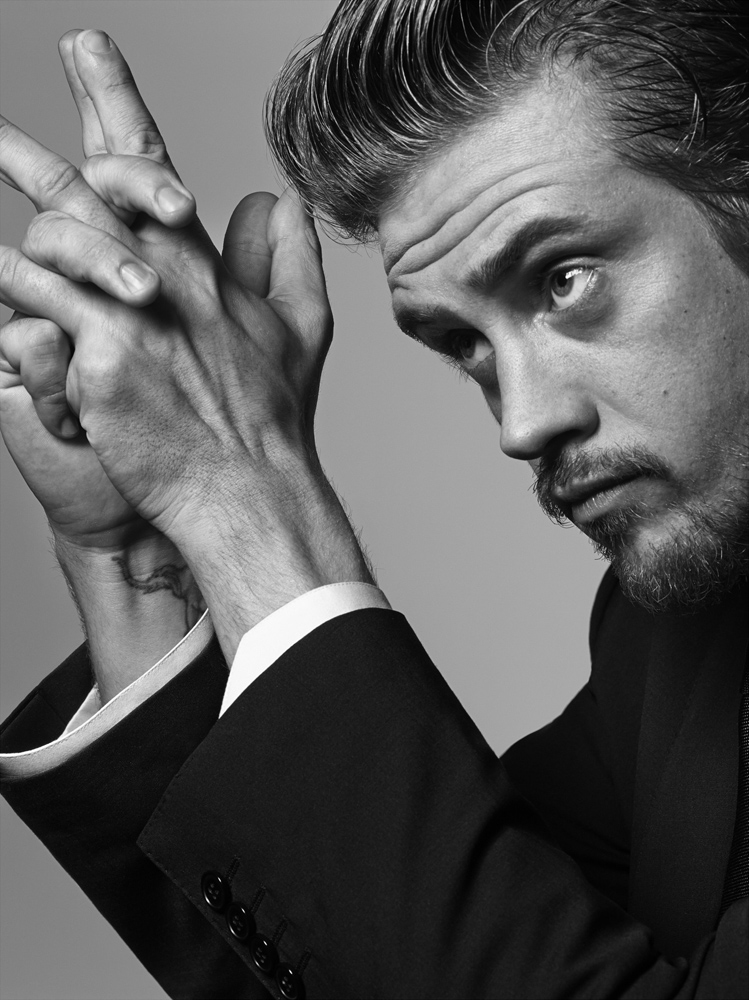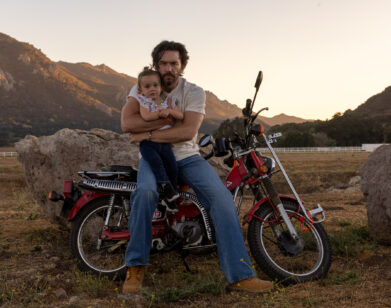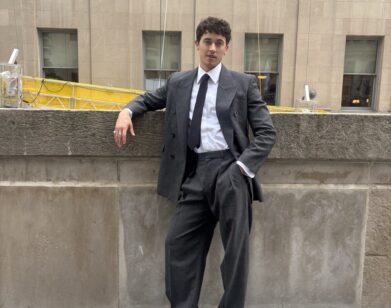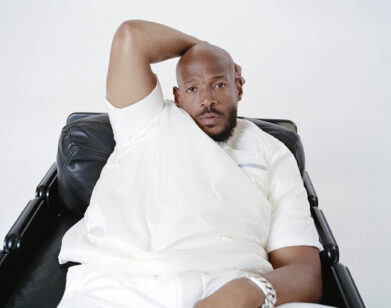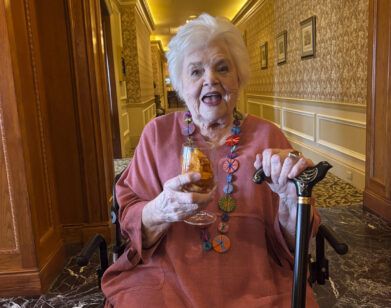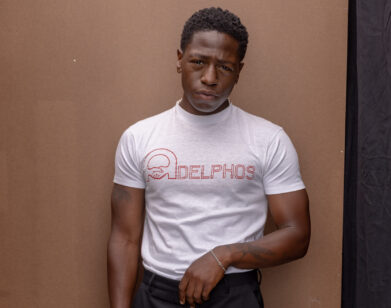Boyd Holbrook
I want to feel that, I want to do that, I want to get that across. I want to make someone feel that way, like I’m feeling right now. Boyd Holbrook
Just yesterday, it seems, Boyd Holbrook was an actor known for turning in good performances in supporting (or supporting-supporting) roles in indie films: He popped up in Gus Van Sant’s Milk (2008) and played a brooding musician in the 2011 drama Higher Ground. He’s even done some prestige television series like The Big C. Holbrook was memorable, if not exactly immediately identifiable. Now, consider, he had two films out last year, has four out this year, and will have five in 2015, including his first starring role, as a coal miner recovering from a stroke, in the dark and heartrending Little Accidents. The 32-year-old actor has already worked with directors that stars wait their whole careers for—Steven Soderbergh, Terrence Malick, and David Fincher, among others. He’s also starring in Netflix’s next hot series, Narcos, in which he plays a DEA agent who helps track down Colombian drug kingpin Pablo Escobar. It goes without saying that Holbrook is strikingly handsome, having helped put himself through school by modeling, and he’s engaged to actress Elizabeth Olsen, whom he completely adores and with whom he shares an apartment in Brooklyn.
When you look at him in this light—in the breathless prose of today’s celebritocracy—Holbrook seems to have neatly transformed from “that guy from that movie” to someone you could pretty much feel justified in, well, hating till your eyes turn green. But here’s the thing: Not only is he a remarkably smart and sensitive guy, he’s also a really good actor. There are plenty of men out there who fumbled and bumbled their way into a modicum of stardom—the ones who are everywhere now and who you’ll barely remember in five or ten years. But Holbrook is the genuine article. He didn’t always dream of becoming an actor as a kid growing up in Kentucky; he spent his time making art and writing. A chance encounter with an actor set him off on a course with a theater company. And ever since, Holbrook has steadily done better than expected, always being a bit more memorable than he needed to be—like his cameo in Out of the Furnace as a creepy and skeevy drug dealer, or his bit as the suave yet skeevy diving instructor who has a torrid fling with Kristen Wiig‘s character in next month’s dramedy The Skeleton Twins, or as the skeevy yet skeevy hick in the highly anticipated fall Fincherian mystery Gone Girl. And as much as he loves to joke about the skeeviness he brings to so many characters, it’s also revealing how much passion and talent Holbrook brings to the set. He’s far more interested in managing to convey some real depth and moral sketchiness in his characters, rather than in being just another handsome face—for you to love or hate.
DAVID COLMAN: Where do you live these days?
BOYD HOLBROOK: I live in Brooklyn. South
Williamsburg.
COLMAN: And where are you from originally?
HOLBROOK: Kentucky.
COLMAN: Oh! Because I was just watching Little Accidents, which is set in the South, and you were very good in it. Very convincing. But then I saw The Skeleton Twins, and I was like, “No, he’s Australian.”
HOLBROOK: No!
COLMAN: I was beginning to think that every actor had to be Australian now.
HOLBROOK: It’s so funny how it’s impossible for an American actor to play an English part or an Australian part. But by all means, come and bastardize our accent as much as you want. But it was fun to do a comedy—I thought it was better to play him that way, as an Australian. It needed that extra little bit of something.
COLMAN: I agree, that character looked too cool and sleazy and Brooklyn to just be from Brooklyn. Does that make sense?
HOLBROOK: Absolutely.
COLMAN: You have, what, four movies coming out this year? Very Good Girls, The Skeleton Twins, Gone Girl, A Walk Among the Tombstones. I watched the trailer for A Walk Among the Tombstones, and it looks very intense—like Dirty Harry [1971] with a really dark element thrown in there. How does your character fit into it all?
HOLBROOK: I play a recovering addict. My character, Peter, he’s got secrets—but I’m holding some stuff back. He’s definitely a troubled guy. He made some bad choices and he’s trying to make up for it as best he can. He just doesn’t have the tools to deal with this stuff. He’s dealing with his family, his own habits, he’s trying to right wrongs. And I think this thing has become too overwhelming, and he’s unable to grip it. It’s from a really well-known detective novel by Lawrence Block.
COLMAN: How much research do you put into a role like that?
HOLBROOK: I like to do a lot of research—not that playing a junkie or heroin addict you’d need to be shooting up, but I would lurk around methadone clinics and bum cigarettes and just talk and hang out with these guys and soak up as much as possible. That way, after a while, it’s in your bones. With Little Accidents, I spent probably three months working with a physical therapist, just understanding, starting from square one, about the neurological makeup of what happens when you have a stroke, or what carbon monoxide poisoning does to your body. I thought that it was very important for me to understand that, rather than going down there and making shit up.
COLMAN: Impressive. How did you end up acting? Was it something that you wanted to do when you were young?
HOLBROOK: I wrote a lot. I was in programs for drawing when I was a kid. And when I got to high school, all that shit had just been cut out; I do come from a very small, Appalachian sort of town in Kentucky that borders West Virginia, and there’s just not a lot of that down there. I saw an amazing film when I was 16 called Slam [1998]. It’s about a spoken-word poet. Saul Williams is in it. Anyway, he goes to jail and he likes poetry; he’s just so fucking passionate. In this prison system, these two gangs go after him. And they’re about ready to have this big fight, and he just drops this fucking spoken-word piece. I mean, he’s genius. I just felt all this passion coming out from the guy. That’s what I want to do. I want to feel that, I want to do that, I want to get that across. I want to make someone feel that way, like I’m feeling right now.
COLMAN: That’s a good instinct for getting into acting.
HOLBROOK: I remember I was talking to a friend, and it dawned on me, “Oh my God, we can actually do that.” I never even realized you could do that. I sort of tried to get a basketball scholarship out of high school, but that didn’t happen. Then I started working for UPS, and that paid for tuition for school. I moved to a bigger town, Louisville. I did it for a year. I had to work the graveyard shift. And then you get off at eight for classes, so that sucked. Then I dropped out. And I was working in Lexington when I recognized this actor, Michael Shannon, and I was like, “What do you do?” He told me to get into a theater company, so I got into a theater company near my hometown. I was a carpenter there. And then I slowly got some work.
COLMAN: Michael Shannon is good.
HOLBROOK: Yeah, he’s great. It was so funny, I almost got to work on Jeff Nichols’s Midnight Special, with Michael Shannon, which would have been a cool loop around, but I had some scheduling dates with Gone Girl. I was so pissed off—I could have ripped a door off … Of course, not that I didn’t love working on Gone Girl—that was a dream.
COLMAN: I just read that book.
HOLBROOK: I play this guy Jeff; he’s kind of a dumb thief.
COLMAN: The character, Amy, meets this girl and a guy. You’re that guy. That’s what I thought, because someone said you play a skeevy hick or something. [Holbrook laughs] Funny, you’re like, “Where does it say I play a skeevy hick? Goddamn it!”
HOLBROOK: I like the word skeevy. I think it’s very sexual. It reminds me of hickeys. Skeevy, hickeys. The phonetics.
COLMAN: I think it just sounds like, “Oh, he’s gross because he hasn’t maybe showered in three days, which also means you want to have sex with him.” Was all the crazy anticipation for Gone Girl daunting? Did it affect your experience with the movie? Are you all worried about how it will be received?
HOLBROOK: Well, it’s funny—Gillian Flynn is a killer writer, her books are so original, and obviously David Fincher can’t make a bad movie—but I’ll be honest with you, I didn’t read the book. I just found my character and read that particular part of the book. My job is to create my interpretation of it. So I wouldn’t say I was really intimidated by it, just more excited to be a part of something like that.
I like to do a lot of research—not that playing a junkie or heroin addict you’d need to be shooting up, but I would lurk around methadone clinics and bum cigarettes and just talk and hang out with these guys and soak up as much as possible. Boyd Holbrook
COLMAN: Okay, so wait, we got off track. Somehow you ended up in New York.
HOLBROOK: I got here and started apprenticing for a sculptor, Fernando Mastrangelo. He is phenomenal. I think he’s really just starting to blow up. He’s got work at the Brooklyn Museum. So I did that for a while. I had my own show.
COLMAN: Oh, I didn’t know you were an artist.
HOLBROOK: Well, I’m not anything to brag about.
COLMAN: Well, I’m going to brag about it. What kind of art did you make?
HOLBROOK: Fernando does a lot of mold—making and casting and stuff like that. So that’s the sort of thing I was working with as well. I did this piece called Iscariot, which was based off of the Gospel of Judas that was found with all these parts that weren’t in the Bible. I made a kind of tongue-in-cheek work about it, casting a figure of Christ in a bubble bath with the Tree of Judas hanging over, and Judas is made out of these flowers, extending these bees that were wrapped around his hands.
COLMAN: You were also a model, too, right?
HOLBROOK: Yeah, I actually got myself through school that way.
COLMAN: What was your most glamorous modeling gig?
HOLBROOK: Oh, God, probably a J.C. Penney double-spread somewhere.
COLMAN: Did you do runway?
HOLBROOK: I did, once, a Calvin Klein show and a Dior show. Yeah, I was super lucky to get that. It just enabled me to do more things—got me through school, film school for a while, auditing classes at Columbia and NYU.
COLMAN: If you could be any superhero, which one would you like to be?
HOLBROOK: I don’t know if there’s a superhero I want to be, that’s not really in the realm of how I think, though I admire what Christian [Bale] and Christopher Nolan did with Batman, where they really stretched and made something different. It’s tricky; it really depends on the project. It’s a big fad now, and I think, ultimately, they’re fun. You give your 13-year-old self all that food to eat, that sustenance.
COLMAN: Are there parts that you were like, “Oh, I would have really loved to have done that?”
HOLBROOK: Yeah, I read Dallas Buyers Club. I read Jared Leto’s part, and thought, “That’s a great part.” I couldn’t get a meeting to read for that. But it was an extraordinary role and extraordinary story. There are all kinds of directors I want to work with and all kinds of films that I want to do.
COLMAN: Now, you just directed something, correct?
HOLBROOK: Yes. I found this little short story of Sam Shepard’s called “Peacock Killer.” It’s just one paragraph, and I got obsessed with that. I have some features that I’m looking to direct, but I think it was smart to do a short that was interesting. It’s about a man and his dog—his dog eats peacocks, he kicks the shit out of his dog and ends up finding out how much of a nuisance the peacocks are, and he goes after these little suckers.
COLMAN: Nice. Okay, what can you tell me about Narcos? You are about to play a DEA agent, right? What kind of research or prep did you do for the film? Did you watch Scarface [1983] over and over?
HOLBROOK: I play Steve Murphy, the DEA agent who actually ended up tracking down Pablo Escobar. Steve’s still around; I’m about to go live with him for a month, in Virginia. We’re going to go to Quantico, which is a training facility there, and do things like raid-training and wire-tapping. I spent hours on the phone with him, talking about where he grew up, out in West Virginia. I don’t think I’d want to run into him on the wrong side of the fence, but he’s a lovely guy. He’s got a family; he ended up adopting two little girls in Colombia when he was living there with his wife. What’s really attractive about Steve and the story is that he went for the main artery—he went straight for Pablo. He didn’t go for the minor players. He held out and tried to go for the root of where things sprang from. You can clip a tree, but if you don’t pull out the root, it’ll keep growing. Wagner Moura is a beast of an actor; he’s playing Pablo. And Pedro Pascal, who was just on Game of Thrones, plays my partner. It’s all sort of snowballing with all of these excellent actors and characters creeping in. We’ll be in Colombia for five months.
COLMAN: How many nights a year do you actually sleep in your own bed?
HOLBROOK: Last year? I don’t know, man. I did so many films last year. In Out of the Furnace, I’m in, like, two scenes. Christian [Bale] kind of nudged me into the Malick film. It was a cool character, very transformative—I like playing a strange person. But this year I haven’t worked as much.
COLMAN: You’re out of work, is that what you’re telling me?
HOLBROOK: I’m absolutely broke and out of work. I spent all my money on cars.
COLMAN: [laughs] Do you have a car?
HOLBROOK: No. I do love cars, though I’d get a bike if I lived out in L.A. A Ducati Classic. Kinda nice, kinda fast, kinda cool. And I like to go slow.
COLMAN: You like to go slow on a motorcycle?
HOLBROOK: Dude, I got hit by an ambulance last year. [laughs] If you’re going to get hit by a car, make sure it’s an ambulance.
COLMAN: Where were you?
HOLBROOK: I was in L.A. on one of those roads.
COLMAN: There’s a bunch of them there.
HOLBROOK: I was late for something. And I tried to sprint on a bike around this guy, and he put his side right into me. I’m thinking, “Oh my God, this guy’s going to crunch me. I’m going to die.” Finally, I slow down enough, and he keeps on going, and I just eat it on the ground. I go sliding. Then I stopped, and the guy gets out and goes, [mocking voice] “So sorry, dude, are you all right?”
COLMAN: Yikes. Okay, so I was with a friend and I was like, “Do you know anything about this guy, Boyd Holbrook?” He said, “Well, he’s dating Elizabeth Olsen.” How did you two meet?
HOLBROOK: We met in New York, doing a gig. And, yeah, she’s super fantastic.
COLMAN: Do you live together?
HOLBROOK: We do. She’s magic. I should probably tell you we’re engaged.
COLMAN: You have asked her? She said yes?
HOLBROOK: She did say yes.
COLMAN: So it’s not like something you’re still going to ask.
HOLBROOK: Actually, that’s the whole plan, for her to read this article.
COLMAN: You’ll be like, “Honey, big surprise—I want you to read this story.”
HOLBROOK: “You have to say yes, you have to say yes!” [laughs] Oh lord.
DAVID COLMAN IS A NEW YORK CITY-BASED WRITER AND ARTIST.

